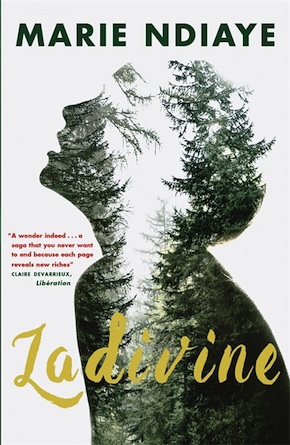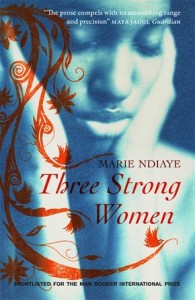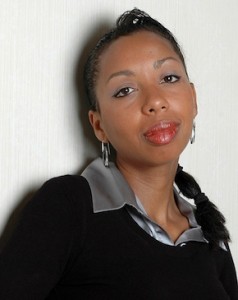Divine wonderlands
by Mika Provata-Carlone
“Ladivine is a wonder indeed… like a saga that you never want to end because each page reveals new riches.” Libération
Since at least the early twentieth century, the question of identity, the vital reality or stark falsehood of such a concept, has been at the core of the most serious literary writing. From existential anxiety and historical misappropriation, to the dispossession or conscious denial of individuality, writing now seems to be at an even more fragile point: how can one question or confirm a sense of self (national, social, personal) in a multicultural, global, transnational world experience?
Marie NDiaye is perhaps ideally positioned to at least enunciate the conflict and delight inherent in fluid or blurry boundaries or origins, in racial, national, cultural, gender and ethical profiles. Marie NDiaye is French (“100% French” as she asserts). She was born a few kilometres outside Paris, the daughter of a French mother and a Senegalese father who disappeared from their lives when she was one year old. By her own admission, she enjoys feeling like a permanent exile, constantly tries to negotiate her sameness and difference. For many, because of the external image in the mirror, she is a Francophone writer, a French African, representing the voice of a double heritage, a colonial past and a fully French present. Yet she refuses this identification, just as she declaredly regrets not being able to claim it and possess it. As a result, her writing has a profoundly intangible quality, a mystic lilt of echoes and allusions, and a mysterious umbilical cord with a primal centre, from which all narrative, perhaps, is born.
Ladivine, NDiaye’s second novel to be published in English, is a fabric of several wefts running through a single warp: Who or what are we? Who or what determines us? What are the limits of our freedom? And is there freedom in anyone’s existence? It is the story of three women and three men (mothers, daughters and wives, fathers, husbands and lovers) – or of a single woman and the man who provides the necessary reflection and refraction to her multiple, multiplying and mutating existence. It is a novel of intermingling voices (or the reported echoes of those voices), above all of the voice of Malinka/Clarisse, daughter of the ‘servant’ Ladivine, and of her daughter, a new Ladivine who will disappear before the end of the novel somewhere between a dream and a nightmare, illusion and reality.
This is a novel that moves and expands in Vico-like circles. Each ringlet has a theme, a thread that weaves among the intermingling voices and inter-melting individual characters.”
Ladivine is an unflinching and at the same time languid exploration of the minutiae of female existence. Of racial integration and classification. Of social determination and historical possibility. Of a permeating, almost naturalised violence and the yearning for stillness, for a white light of spiritual and emotional purity. NDiaye offers us what she has disclaimed: the experience of mixing races and cultures, of welding together memory and forgetting, the process of erasing and rewriting the self through language, social reinvention and mobility, financial success and escapist perfection. She confronts us with hope and despair, grandeur and disgrace, liberalism and dogmatism, light and a great deal of darkness. Clarisse/Malinka tries to be all she can be and everything she is not, and cannot achieve. In creating two lives which she tries to live simultaneously, and to the extent of her abilities impeccably, she loses both of her constructed worlds (bourgeois white wife and dutiful daughter of an African domestic help) to a nightmare of compromises. She takes on a lover who absorbs all she has to give and responds to the ‘real’ Malinka with brutal unpretentiousness. So brutal, so unreservedly honest, that he will viciously murder her.
 We are invited to sympathise with this young woman trying to fit in, to evolve as required (socially, historically, subconsciously, compulsively) and yet remain loyal, but also to pity her; to feel closer instead to her bewildered husband (until we are exposed to his own obscurity and ambition) and to the daughter who finds herself suspended between parents but also between cultures, as she marries a German whose parents have an almost devouring understanding of family relations and ties. NDiaye especially invites us, very quietly and delicately, to move ever closer to the Ur-mother of the story, Ladivine Sylla, who combines the lowliness of her origins and profession with an inscrutable dignity and perseverance, a definite immanence and eternity.
We are invited to sympathise with this young woman trying to fit in, to evolve as required (socially, historically, subconsciously, compulsively) and yet remain loyal, but also to pity her; to feel closer instead to her bewildered husband (until we are exposed to his own obscurity and ambition) and to the daughter who finds herself suspended between parents but also between cultures, as she marries a German whose parents have an almost devouring understanding of family relations and ties. NDiaye especially invites us, very quietly and delicately, to move ever closer to the Ur-mother of the story, Ladivine Sylla, who combines the lowliness of her origins and profession with an inscrutable dignity and perseverance, a definite immanence and eternity.
This is a novel that moves and expands in Vico-like circles. Each ringlet has a theme, a thread that weaves among the intermingling voices and inter-melting individual characters: motherhood and a daughter’s relation or dissociation from the bloodline that determines her, adolescence and the dream or delusion of self-fashioning, the tabula rasa of social existence, husbands and wives, fantasy and imagination, passion and violence, truth and falsehood, the crushing weight of memory and the agonising weightlessness of forgetting, the nostalgia of the concrete and the exotic. There are some circles that are wider than others, stronger, more ineluctable: fear (a “sacred terror”), duty, kinship, lowliness, loneliness, darkness and secrets. Patterns are repeated, destinies thwart individual dreams and voices, and the clash between self-definition and affinity, between uniqueness and a gentle if imperfect humanity, becomes the centripetal force of a near-titanic struggle to break free from an undefined menace of tolerance, attachment and belonging – but also of indifference, emotional narcosis and obliteration. The boundaries of reality and a world of figments, enigmas, dark holes of perception, constantly dissolve, just as the distinction between authenticity and construct is always fought against, until in an unnamed ‘southern’ country (South Africa? Kenya? Senegal? Nigeria?) Ladivine the daughter and granddaughter now resembles all women and fuses into nothingness, disappears into an elemental omnipresence that recalls Ben Okri’s Famished Road, as she is absorbed into a chilling Conradian heart of darkness.
NDiaye is a craftsman of words and sentences, especially of a narrative medium that has the arresting authority of endlessness. She is famous for having written a short story where a single syntactical phrase flows unstoppable for two hundred pages. In Ladivine the torrent is both verbal and existential, a roman-fleuve of unhinged minds and paralysed hearts, spectral double realities asserting themselves through recollections and names that disjunctively enhance the sense of alienation and impossible – inescapable – sameness. A world of spirits and dispirited people. She continues the stylistic tradition of magical realism, using the fantastical, metamorphosis, or witchcraft and ghosts to create a contemporary vernacular with neo-gothic echoes. She “upsets our habits as readers” as one reviewer has said. At her best, she gives us an exquisite torn and indecipherable palimpsest, of a story half-remembered, vitally yearned for, even if there are some unequal moments in her writing, especially in the conclusion of Ladivine, and perhaps also in the rhythm and cadence of the English translation. She is a haunting, powerful new voice in French literature, providing an intriguing, beguiling experience for English readers.
 Marie NDiaye was born in Pithiviers, south of Paris, in 1967. She published her first novel at seventeen, and has won the Prix Femina (for Rosie Carpe in 2001) and the Prix Goncourt (Trois femmes puissantes, 2009; published in English as Three Strong Women in 2012). Her play Papa doit manger (2003) was only the second play by a woman to be taken into the repertoire of the Comédie Française. She lives with her family in Berlin. Ladivine, translated by Jordan Stump, is published by MacLehose Press in trade paperback and eBook, and was longlisted for the 2016 Man Booker International Prize.
Marie NDiaye was born in Pithiviers, south of Paris, in 1967. She published her first novel at seventeen, and has won the Prix Femina (for Rosie Carpe in 2001) and the Prix Goncourt (Trois femmes puissantes, 2009; published in English as Three Strong Women in 2012). Her play Papa doit manger (2003) was only the second play by a woman to be taken into the repertoire of the Comédie Française. She lives with her family in Berlin. Ladivine, translated by Jordan Stump, is published by MacLehose Press in trade paperback and eBook, and was longlisted for the 2016 Man Booker International Prize.
Read more.
Jordan Stump has translated authors including Marie Redonnet, Eric Chevillard and Honoré de Balzac. His translation of Jardin des Plantes by Claude Simon won the 2001 French-American Foundation translation prize, and he was named a Chevalier de l’Ordre des Artes et des Lettres in 2006.
Mika Provata-Carlone is an independent scholar, translator, editor and illustrator, and a contributing editor to Bookanista. She has a doctorate from Princeton University and lives and works in London.

